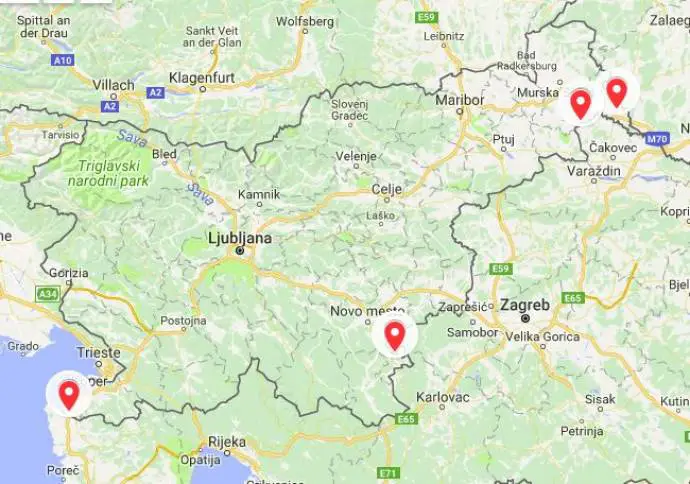Slovenia has enabled those who ended up on the Croatian side of the border to keep their civil rights and obligations through a special law that is part of the arbitration package.
The law applies to Slovenian citizens or legal entities who a day before the award was declared had their permanent residence or real estate or a company based on the territory awarded to Croatia.
The idea is that they benefit from financial aid to buy a new property in Slovenia, while keeping their old one. They have three years to move.
By 11 June, the Public Administration Ministry received 32 applications concerning 84 persons, including 20 from the Piran area on the coast, and six each from the administrative units of Ljutomer and Metlika.
Nine of these are one-member households, another eight are families of four, one of five and one of six members.
The ministry has so far issued decisions in 22 cases, 18 of which are final, and payments have so far been paid in 12 cases, amounting to almost EUR 1.5m, with four more due by the end of the month.
Decisions in ten applications are still pending, and if all are positive, the amount of payments will come close to EUR 2.38m, the Public Administration Ministry said.
Meanwhile, the Agriculture Ministry will pay out subsidies for 136 hectares of farmland owned by Slovenian citizens that ended up on the Croatian side. The subsidies will be paid only for 2017.
However, the users of the land will be able to get compensation for loss of subsidies which the ministry estimates at EUR 280,000 or five-fold the sum of subsidies for the plots for 2017.
No major problems in Dragonja area
No major problems are reported from the left bank of the Dragonja river, which was awarded to Croatia along with several hamlets, including the house of Joško Joras, a self-styled defender of the border.
Denis Fakin, the head of the Sečovlje local community, says that the locals who asked to move over to Slovenia are mostly happy with what they were offered.
"Everyone is calm, except for the few exceptions we know well enough," he said, adding that the local authorities were likely to help the families as well.
The municipality is yet to implement the arbitration award after the Piran city council failed to amend local statutes by removing the hamlets on the left bank of the Dragonja from its registers.
Implementation in Bela Krajina smooth
According to Mayor Darko Zevnik, post-arbitration affairs are also running smoothly in the southern municipality of Metlika.
Six families from the village of Brezovica pri Metliki have decided to move over to Slovenia, including a whole farm. Matters such as roads and the land register are also being taken care of.
Progress slow in Pomurje
In the north-east, Lendava Mayor Stanko Gjerkeš is not as happy with the progress so far. He says that nothing has so far been done except for meetings between government officials and those affected.
Likewise, Stanko Ivanušič, the mayor of the small municipality of Razkrižje, reports that people are being put off by what they see as too detailed examination of their status and eligibility.
The local community is not getting any feedback from the state authorities in administrative procedures, and there is "quite a gap" between politicians' promises and procedures run by clerks.
Ivanušič also noted that a family that ended up on the Croatian side also ended up without access to emergency medical help, but this had been sorted out now.
Fishermen take the full brunt
While procedures on land are running more or less smoothly, the tug-of-war at sea continues, albeit at somewhat lower intensity than immediately after the award was declared.
The Slovenian police registered 1,134 cases of unauthorised crossing of the border line by a total of 1,670 Croatian vessels by the end of last year, including 963 fishing boats.
Since Slovenia enforced the award on the ground at the beginning of the year, the police registered only 253 unauthorised entries by 431 Croatian vessels, including 198 fishing ones until 7 June.
The police would not say how many fines they have issued to Croatian fishermen for illegal crossing, but the fishing inspectorate issued 16 fines averaging 840 euro by 8 June.
The fined Croatian fishermen have appealed against each of the fines, however procedures are still pending.
Croatian fishermen could ask for permits to do business in Slovenian waters in line with the relevant EU directive, however none of them has sought one yet, the Agriculture Ministry said.
Croatia has retaliated by fining Slovenian fishermen crossing the median line in the Piran Bay, which it sees as the border.
According to Ivica Senjak, the Croatian lawyer representing Slovenian fishermen, these had been issued 110 fines by 6 June, 70 of which from police for violating the border and 40 from the fisheries administration. They amount to roughly EUR 133,000 in total.
After a complaint, the Croatian police halted proceedings in 12 cases concerning the Izola-based fishing company Riba.
Fisherman Silvano Radin from Koper says that Slovenian fishermen are not crossing the median line because there are enough fish in the port aquatorium. They are unlikely to venture across before July.







